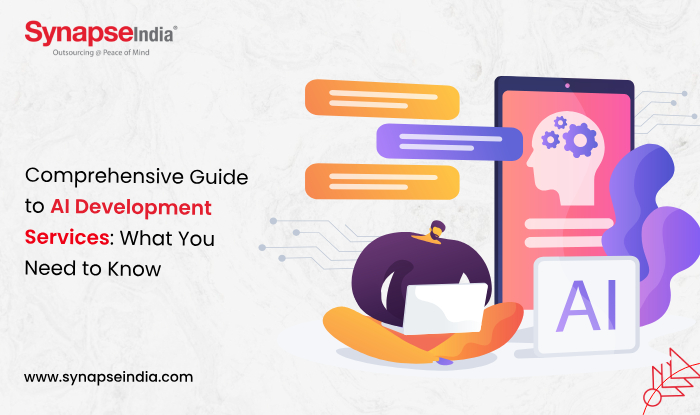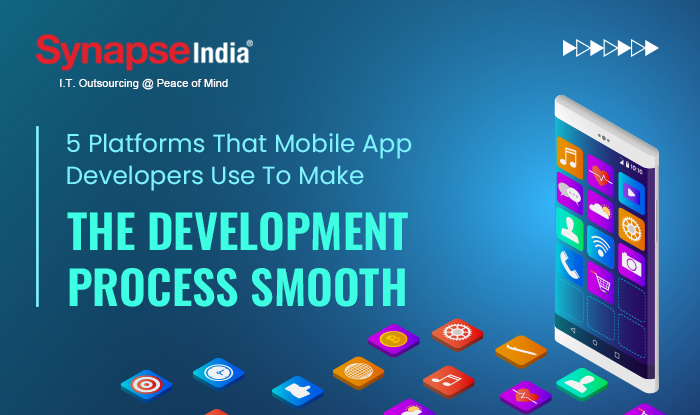 16 Dec 2024
16 Dec 2024
AI is among the most trending technologies, driving innovation and creating new opportunities across various sectors. Be it healthcare or real estate, finance or e-commerce, there hardly exists a single industry that is not being touched by this revolutionary technology.
Businesses that are successfully able to harness artificial intelligence to their maximum potential are gaining a competitive edge in the market, experiencing operational efficiency like never before. For those looking to leverage its capabilities, hiring professional AI development services is the right way to get custom solutions developed for their specific processes and operations.

AI development services are a great way for businesses to integrate AI technologies into their operations. Professional AI development services offer you a reach to AI experts who can help you get solutions that meet the very specific needs of your business.
Be it designing and building AI-based systems, creating custom AI algorithms, automating tasks, enhancing data analytics capabilities, or developing intelligent applications such as chatbots, recommendation engines, or predictive maintenance tools, the experts can do it all for you.
The right AI software development company can provide a wide range of services ranging from machine learning (ML) and natural language processing (NLP) to computer vision and robotics. With their expertise in software development, data science, and specialized AI technologies, they can create robust solutions tailored to specific business needs.
Depending on the technologies involved and the specific business needs they address, AI development services can be categorized into several distinct types. Here are the key types:
Machine Learning is a subset of AI that focuses on creating algorithms that allow systems to learn from data and improve over time. It involves building models that are trained on labeled data to make predictions or classifications or creating systems that can analyze and cluster data without labeled examples, discovering hidden patterns in datasets. Deep learning, which yet again is a subset of ML, uses neural networks with multiple layers to analyze complex patterns in data, such as speech, text, and images.
NLP focuses on enabling machines to understand and interpret human language. AI development services in NLP include speech recognition to convert spoken language into text, enabling applications such as voice assistants and language translation to develop algorithms that can automatically translate text from one language to another. Creating AI-powered bots that can engage in natural, context-aware conversations with users also comes under NLP.
Computer vision facilitates machines to interpret and understand visual data from the world, such as images and videos. It involves image recognition which enables identifying objects, people, or scenes within images, face detection to allow recognizing and verifying faces in images and videos, and object tracking for following specific objects within videos or real-time streams.
Robotics is an AI application that involves creating smarter machines that can perform tasks autonomously. These machines can automate repetitive tasks across various business functions such as HR, finance, and customer service. Popular examples include self-driving cars, drones, and robots that can navigate and make decisions without human input and industrial robots that can perform manufacturing, assembly, and quality control, powered by AI to enhance operational efficiency.
AI development services related to analytics help organizations make better, data-driven decisions. It includes predictive analytics using AI to forecast future trends based on historical data, helping businesses anticipate customer behavior, market shifts, and operational challenges. It also empowers Business Intelligence (BI) solutions, creating custom BI tools powered by AI that allow businesses to gain deep insights from their data.
AI development relies on a variety of cutting-edge technologies that power intelligent systems. Here are some popular technologies that are streamlining AI software development.
Machine learning frameworks are used to build, train, and deploy machine learning models. These frameworks support various types of ML algorithms and help developers create custom solutions faster.
Cloud platforms are important for scaling AI models. Once your business grows and you wish to expand the existing AI models to a greater level, these cloud solutions prove to be very useful.
Data analytics and visualization tools are required for processing, visualizing, and analyzing data in AI development. These tools turn raw data into actionable insights and enable the creation of AI models for specific purposes.
NLP is all about processing and understanding human language. NLP libraries enable AI applications to perform tasks related to language translation.
Neural networks are the foundation of deep learning. They are used in AI to solve complex problems, such as image and speech recognition, and find applications in the development of autonomous vehicles and virtual assistants.
Developing AI solutions is a multi-stage process with each progressing step as important as the previous one to ensure the successful implementation of AI technologies. Just like any other software development process, AI software development begins with getting an idea of the challenge it aims to solve and concludes with successful deployment. Well not exactly true, it goes beyond that to offer ongoing support and maintenance for the deployed solution.
While the comprehensive AI development process may vary based on the complexity of the project, the following steps are commonly involved:
Before designing and developing Artificial Intelligence solutionsArtificial Intelligence solutions, it is crucial to understand the business problem it aims to solve. For example, a healthcare company might deploy AI solutions to enhance patient care while a telecom company might need it to streamline customer service. So, before you move any further into AI development, you must define its objectives, desired outcomes, and success metrics.
Once the objective is defined, the next stage is collecting and preparing data. Since AI systems rely heavily on data, the quality of the data can significantly impact the performance of the AI solution. As such, you need to gather relevant datasets and clean and preprocess them to ensure they are ready for training. The models you design for training will heavily depend on the data being used plus the expertise that is used to develop these models.
Depending on the objective, AI developers will create a machine learning model, a deep learning neural network, or a natural language processing model. The developed model will be trained on the prepared data to identify patterns and insights and will be evaluated against various performance metrics to assess its accuracy, efficiency, and robustness. If any issue or deviation is found during the evaluation stage, it may need further tuning or adjustments.
Once the model successfully passes the evaluation, it is finally deployed into a live environment. The AI system is integrated with existing business applications, ensuring that it functions correctly and is scalable to handle real-world data.
AI systems require ongoing maintenance and optimization to adapt to new data, improve performance, and ensure long-term reliability. This phase involves retraining models with updated data, troubleshooting issues, and refining AI algorithms as needed.
Although the steps to develop and deploy AI systems seem simple, proper knowledge and experience with this technology are required to do it successfully. For the best results, businesses are suggested to go to a renowned AI development service provider who can handle all the complexities and challenges of the development process to deliver custom solutions that exactly meet your required objectives. Here are some tips for evaluating potential partners:

AI development services are transforming the way businesses operate, enabling them to harness the power of data, automation, and intelligence. AI technologies offer a wide range of possibilities for improving efficiency, enhancing customer experiences, and driving innovation. By understanding the different types of AI services, key technologies, and development processes, businesses can make the most of this technology. Whether you are looking to automate tasks, gain insights from data, or develop intelligent applications, AI development services provide the expertise and tools needed to achieve your goals.

 09 Mar 2023
09 Mar 2023
